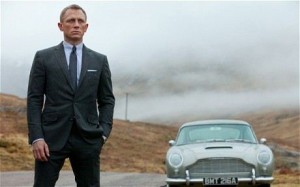Monday morning, October 1. I’m listening to National Public Radio on the way to work and they introduce a weeklong series on James Bond. Really. I didn’t realize this, but this week happens to be the 50th anniversary of the release of the first Bond movie, “Dr. No.” This film, as I mentioned in an earlier post, was filmed in Jamaica and provoked my original question about who we should be more interested in: James Bond or Samuel Sharpe.
Well, that did it. I decided I just had to bring NPR into round three of our contest. After all, my local public radio station advertises itself with the slogan, “NPR. Classical. Other Smart Stuff.” NPR has a reputation of being a news station for thoughtful, highly educated folk who care about the world. NPR goes beyond the facts and gives us insightful analysis. That’s what they tell us during their pledge drives.
So how does NPR do in the contest?
I googled their website to determine how times they have referred to James Bond. I turned up 1700 hits. (Granted, it might be a much higher number by the end of the week).
Samuel Sharpe? Not quite as many.
Zero hits.
I found this rather curious. After all, NPR describes itself as smart. Many people who listen to this station are concerned about justice and ridding the world of oppression. If one wants to be smart and one wants to think about how to fight oppression, then it would seem to me that NPR would be a site that would be more concerned with the history of abolition than the history of a Hollywood action-movie series. (Oh, rats. I think I just tipped my hand.)
Right, (cough), um, what I mean is that if we take an unbiased approach to our contest, then James Bond and Samuel Sharpe have an equal chance at being significant. And surely NPR would be a great source for determining whether, for instance, James Bond or Samuel Sharpe gives us a better model for determining how to rid the world of oppression.

James Bond. Classic cars. Other smart stuff (?)
All the same, I have to admit that I was surprised by the results. So I tried a few of different terms in my NPR website search. Baptist War: zero hits. Slavery Abolition Act: zero hits. Jamaican Rebellion: zero hits.
OK, time to broaden the search. NPR surely has done stories that reference abolition, one of the most significant developments in human history.
And….yes! There we are. Abolition did indeed turn up as a topic on the NPR website. Abolition: 653 hits. William Wilberforce (for good measure): 17 hits.
Huh.
Well, the results are clear. If you like smart stuff and you take your cues from NPR, James Bond is obviously much more important for us to know about than the abolition of slavery (almost three times as much).
Score:
James Bond: 2
Samuel Sharpe: 1
Yeah. Unless…..this depiction of “smart” radio is all wrong.
In that case, maybe it is proof of the opposite….and I should give the win to Sharpe?
 NPR is surprised by this, but I’m not surprised they are surprised.
NPR is surprised by this, but I’m not surprised they are surprised.

